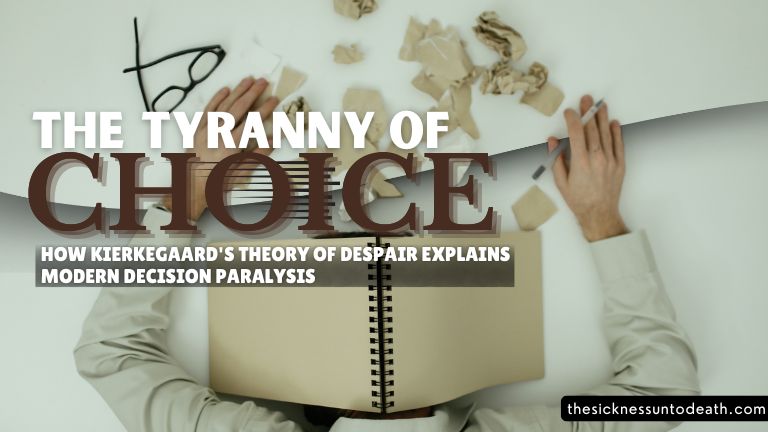In our modern world, choice is celebrated as a freedom, but it can also become a sort of tyranny—a phenomenon that Søren Kierkegaard, the 19th-century philosopher, might recognise well. Kierkegaard’s theories, particularly his thoughts on despair, offer profound insights into why today’s vast array of choices can leave us feeling more paralysed than empowered.
Kierkegaard and the Paradox of Choice
Kierkegaard believed that true despair is not merely about suffering; it’s about the self’s relationship with itself. He argued that despair arises when there is a misalignment between one’s actual self and one’s potential self. In contemporary terms, this could translate to the anxiety and paralysis that come from the constant pressure to make choices that align perfectly with one’s ideal self-image or life path.
The Burden of Infinite Options
Today, we are bombarded with choices in every aspect of life—from career paths and educational opportunities to simpler choices like what to watch on Netflix or what to eat for dinner. Each choice carries the weight of potential regret or the fear that one wrong decision could steer us away from our ideal life course. This abundance of choices meant to empower us can instead lead to decision fatigue and a sense of being trapped by our own freedom.
Decision Paralysis in the Modern Age
The paralysis comes from a phenomenon psychologists call “analysis paralysis” or “choice overload.” When faced with many options, we often worry about making the perfect choice. This concern can lead us to defer decisions, overthink, or spiral into anxiety—modern manifestations of Kierkegaard’s despair. The philosopher’s exploration of an authentic life—one lived in accordance with one’s true self—highlights the distress caused when we cannot discern which choices will lead us toward authenticity.
Navigating Choices Authentically
Kierkegaard suggests that embracing our limitations and the inevitability of some degree of regret can help mitigate the despair of overwhelming choice. Accepting that not every decision will be perfect allows us to make choices that are “good enough,” reducing the pressure and anxiety associated with the need for perfection.
Practical Steps to Counter Decision Paralysis
- Prioritise Values: Before making decisions, clarify what truly matters to you. Decisions aligned with your core values are less likely to lead to regret.
- Limit Options: When possible, reduce the range of choices. Too many options can be overwhelming, so narrowing down choices can simplify decision-making.
- Accept Imperfection: Recognize that not all choices will be perfect and that mistakes are part of life. This acceptance can free you from the paralysis of perfectionism.
- Cultivate Intuition: Sometimes, the best decisions are made based on gut feelings. Trusting your intuition can help cut through the noise of overanalysis.
- Seek Feedback: Discussing options with trusted friends or mentors can provide new perspectives and reduce the burden of solitary decision-making.
By applying Kierkegaard’s insights, we see that the tyranny of choice, while a modern dilemma, can be navigated by understanding our deeper selves and aligning our decisions with our authentic values. Embracing this approach not only alleviates the despair associated with decision paralysis but also leads us toward a more fulfilling life, one where choices become expressions of our truest selves rather than sources of endless anxiety.

